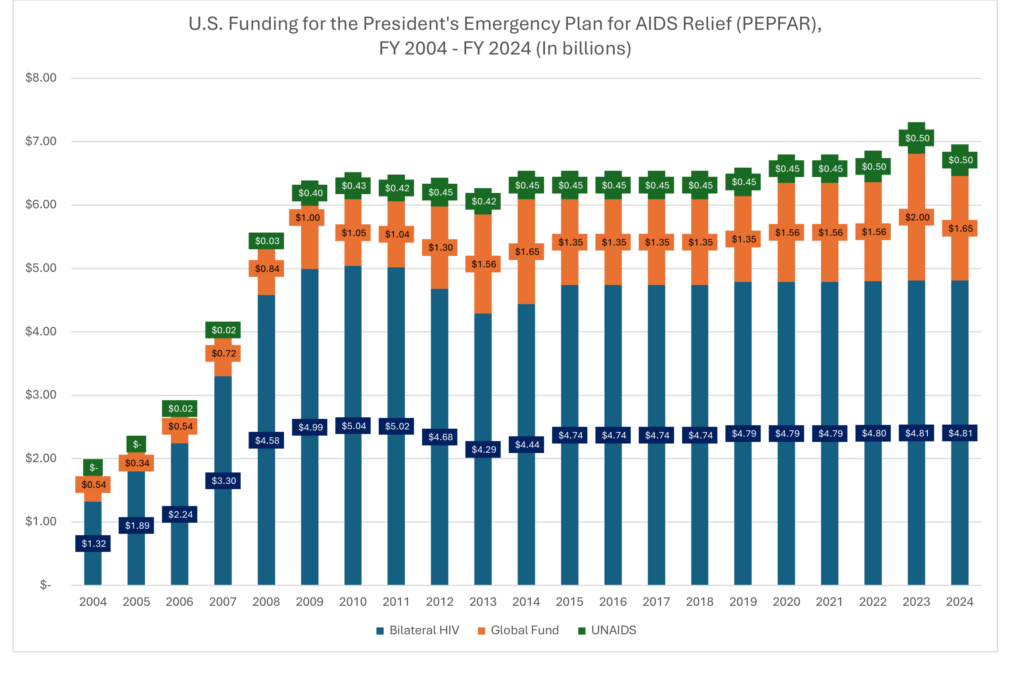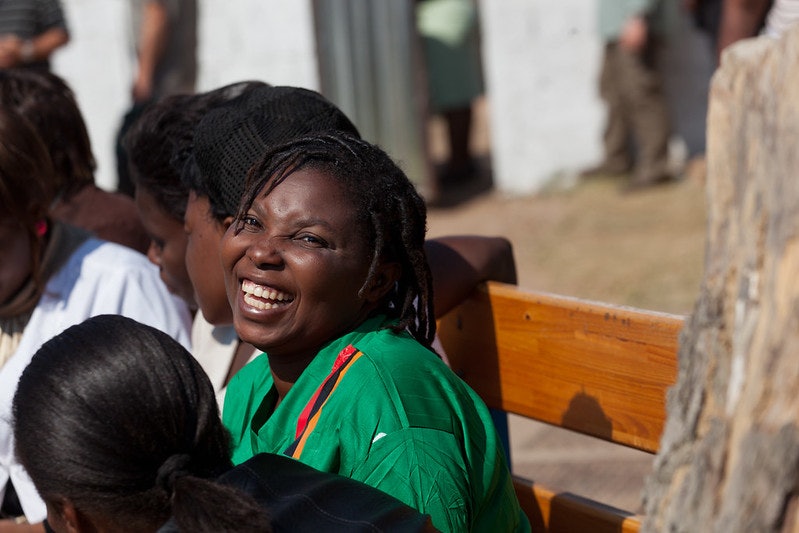Insights from Bush Institute global health expert Hannah Johnson
PEPFAR has saved over 26 million lives in the past 20 years, and it currently provides life-saving antiretroviral treatment to 20 million people around the world living with HIV. PEPFAR is also a cost-effective and accountable program that makes the most of every tax dollar to save lives, stabilize societies, engender good will overseas toward the United States, and deter malign Russian and Chinese influence. Left unchecked, the HIV/AIDS pandemic would have wreaked havoc on the African continent and beyond.
PEPFAR has operated on flat funding for over a decade. In 2024, $4.8 billion was dedicated to bilateral programs that include treatment, mother-to-child transmission prevention, and testing. Across bilateral and multilateral programs, PEPFAR funding is strictly allocated by congressionally-mandated, time-bound provisions.

PEPFAR can maximize efficiencies amid flat funding because of innovative, data-driven techniques. These include site-level metrics to track results, field visits, site-based evaluations, and community-level surveys to check data and prevent fraud, waste, and abuse. PEPFAR’s cost-saving measures make it a model of humanitarian assistance and government spending – one that should be emulated across federal departments that provide international assistance.
Last week several implementing organizations were able to receive payment for completed work and resumed life-saving programming. Under Secretary of State Marco Rubio’s waiver for PEPFAR, it is vital to ensure the program’s work continues uninterrupted, for disruptions in the program can endanger lives that could have been saved.
Sincerely,
Hannah Johnson
Senior Program Manager of Global Policy
George W. Bush Institute
Figure of the Week
1,650,000
That’s how many people could die within a year without American foreign assistance for HIV prevention and treatment, according to a recent New York Times analysis. The Times worked with the Center for Global Development to calculate this figure. They present these and other alarming statistics in a piece by Nicholas Kristof, who interviewed communities in South Sudan and Nairobi, Kenya impacted by the foreign assistance freeze. In the article, Kristof names individuals who have already died directly as a result of the funding freeze.
Ally Updates
UNAIDS reports that a growing number of PEPFAR partners, including in Botswana, South Africa, and Zambia, have received funding termination notices. While some countries have attempted to adjust, others are experiencing severe service disruptions that in some cases have led to widespread panic among people living with HIV and even instances of medication hoarding. Examples of service disruption include:
- In Botswana, civil society organization drop-in centers that provide HIV testing, treatment, and care have been closed, and no staff are available to refer patients to government facilities.
- In Kenya, the agency that distributes viral load tests and antiretroviral drugs is unable to distribute its stock, while antiretroviral stocks run low throughout the country. Transportation for early infant diagnosis and viral load testing is running at reduced capacity.
- Shipments of antiretroviral drugs may not be able to cross from Poland into Ukraine, as payment for the transportation costs has not been confirmed.
Bush Institute Insights
In my latest explainer on PEPFAR, I outline how the astounding success of the program is partly due to its innovative use of site-level data. Unlike most international assistance programs which rely on global data or country-level data, PEPFAR leverages local data to more accurately measure progress and impact. That’s done by combining demographics and other information with the GPS coordinates of the sites where PEPFAR partners operate. This granular data allows PEPFAR to better track its efforts while ensuring it reaches the most vulnerable communities.
The quality of PEPFAR’s data is also backed by a strong system of transparency and accountability. The program regularly administers community-level surveys to validate its data on the testing, treatment, prevention, and number of HIV/AIDS patients. On top of that, PEPFAR uses the Site Improvement Through Monitoring System (SIMS), an enforcement mechanism that relies on programmatic visits to partner sites to guarantee the highest standards for both treatment and data collection.
In the News
- Several country music artists – including Brad Paisley, Amy Grant, and Kix Brooks of Brooks and Dunn – signed onto a letter led by the ONE Campaign in support of PEPFAR programming, according to The Christian Post.
- HIV/AIDS commodities continue to face challenges due to the freeze on U.S. foreign assistance and subsequent terminations of awards. Eight countries – Haiti, Kenya, Lesotho, South Sudan, Burkina Faso, Mali, Nigeria, and Ukraine – have dangerously low stockpiles of antiretrovirals and are at immediate risk of running out in the coming months according to the WHO and Health Policy Watch.
- In Kenya, health clinics are rationing antiretrovirals as the warehouse storing all U.S.-donated HIV medicine in the country has stopped distributing its stock. Reuters interviewed a woman in Nairobi who relies on medicine from that warehouse and fears that current supplies at her clinic might run out soon.
- 1,400 infants are being infected with HIV every day as a result of the USAID funding freeze. The calculation comes from amfAR (the Foundation for AIDS Research) surveys, and was reported in the MIT Tech Review.
- The Dispatch reported on PEPFAR groups struggling to access funds that are supposed to qualify for the State Department’s waiver. Many groups have been unable to draw funds from the USAID payment system, even though they technically have a waiver to continue their programs.
- Several prominent Christian humanitarian organizations have come out in support of PEPFAR, as The Guardian reports. Organizations like World Relief, the humanitarian wing of the National Association of Evangelicals, have been supportive of PEPFAR from its inception, and are now calling for the full reinstatement of its funding and programs
- Chris Breyer, director of the Duke Global Health Institute, wrote an op-ed in The Hill calling on Congress to save and improve PEPFAR. The op-ed coincides with a recent report from Duke’s Global Health Institute that provides recommendations to reform the program over the next five years, including by consolidating agency budgets, partnering with the private sector, and leveraging digital technology.






























